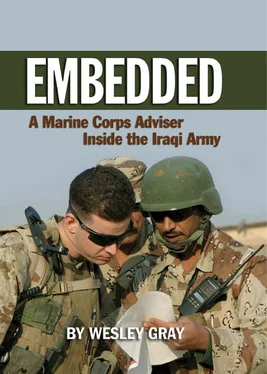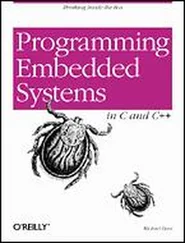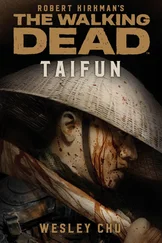We followed up on McShane’s suggestion and approached the problem of forming a new convoy with all of the equipment, personnel, and Humvees from 3rd Iraqi Company. The situation was daunting. Somehow Abdulredha and I needed to organize sixteen vehicles in some sort of convoy order. And all of this had to be completed inside the Baghdadi FOB, which was about the size of a baseball field. Faced with the complex problem, I realized why being an adviser could be a great job. I walked up to Abdulredha and asked, “You got a plan for getting this convoy together? If you need any help, just let me know. I don’t want to get in your way.” Wanting to impress me, Abdulredha replied, “Watch me make this happen. This is a difficult operation for the Marines, but an easy operation for the Iraqi army.”
Abdulredha came through on his claim. Somehow he was able to put together the finest piece of Iraqi army planning I have ever witnessed. Within an hour the convoy was on Route Bronze heading north to Camp Ali. If this excellent performance by the Iraqi army could not convince the boss they were ready to do independent operations, then nothing would. The sooner the MiTT worked itself out of a job, the sooner America could quit wasting time and resources in Iraq.
Chapter 17
The Combat Operations Center Is Launched and the Mission Changes
Late October–Early November 2006
Our lives changed for the rest of our deployment. The Iraqis had shown an ability to conduct successful independent convoy operations, so we shifted our focus from training the Iraqis on the intricacies of combat operations to training them on higher-level functions like centralized command and control. To this end the first Iraqi problem we planned to address was the defunct Iraqi Combat Operations Center.
In addition to a change in the advising agenda, the MiTT attitude changed. From here on out, if work needed to be done, the Iraqis would be doing it. If a problem required initiative to solve, the Iraqis would deal with it. In addition to a shift in attitude, half of the team was pulled away to focus on advising 3rd Iraqi Company, which had moved to Camp Ali a few days earlier. Meanwhile the rest of the MiTT, including me, would be in charge of maintaining and developing the Iraqi COC. From this point forward, our only chance to get outside the wire would be if a quick reaction force were needed. I was bummed I would not be heading outside the wire as often to take part in the action, but I thought I could serve the Iraqis better by staying back in the COC and working with their staff officers to facilitate better command and control. If it all worked out, the Iraqis would be running everything and we would go home.
After a week of sleepless nights, we finally got the Iraqi COC into operation. Its setup was not complicated. In one corner there was a desk for a MiTT watch officer, who advised the Iraqi watch officer on COC operations, and in the other corner was a desk for an Iraqi watch officer, who monitored all combat operations for the battalion. But the new COC was a complete shit show. Nothing worked, communications were abysmal, and the Iraqi officers were not happy about actually having to perform watch officer duties. The Iraqi leadership was accustomed to their cushy jobs. They essentially did nothing except collect a paycheck, chain smoke, and order Iraqi soldiers to do all the work.
An attack on an Iraqi foot patrol in South Dam Village illustrated how poorly the system worked. Upon hearing news of the attack, the entire MiTT converged on the Iraqi COC to see how they could help. Captain Mohammed, the Iraqi watch officer at the time, was on his two-hour lunch break. Fighting the urge to take control of the situation, I talked to Abit, the radio clerk. “Abit, you need to get Captain Mohammed to the COC. We are not gonna do his job for him.” Mohammed responded on his radio. “Abit, just have the Marines take care of the situation—I’m on break.” I grabbed the radio from Abit’s hand and said, “Mohammed, inta mejnoon? Ta’al il harakat, hessey. Il doriya yehtajek!” (Mohammed, are you crazy? Come to the COC, now. The patrol needs you!) Surprised that I had grabbed the radio or understood what he told Abit, he promptly replied in broken English, “Okay, okay, no problem. Now I come COC. No problem, Jamal. No problem.” By the time Mohammed made it back to the COC, the patrol that had been attacked and needed help had already returned to Camp Ali. Way to go, Mohammed.
If Mohammed’s ineptitude wasn’t enough, Lieutenant Kusay, the 3rd Iraqi Company commander, piled on the problems. He walked into the COC around 1300 to talk about his upcoming patrol operations with Lieutenant Le Gette, who was advising him. Acting as an interpreter for Le Gette, I asked Kusay, “Brother, can you tell me what is going on right now with the Iraqi patrol schedule? I don’t even see a schedule posted anywhere.” Kusay explained, “Jamal, our patrol plan is working out so well right now we don’t even need a schedule.” Le Gette and I laughed.
I knew a patrol was outside the wire and I wanted to test Kusay’s knowledge of his own operations. I asked, “Kusay, when is your next patrol leaving?” He confidently replied, “A patrol should be leaving in thirty minutes.” I snapped, “Kusay, there is a patrol outside as we speak, how can there be another patrol leaving in thirty minutes? You don’t have enough men to run simultaneous patrols.” Captain Mohammed, feeling the urge to help defend Kusay, chimed in. “Jamal, I am not sure about what is going on at the moment, but Kusay is the company commander and knows his operations very well.” Le Gette and I gave up. I said, “Kusay, Mohammed, I’m glad you guys are on top of it.”
We followed up with a question about the future of patrolling efforts. Le Gette explained his basic plan to run three patrols every twenty-four hours to keep the insurgents on their toes. Kusay bagged on the proposal. “I think we only need to do one patrol.” Le Gette snapped in return, “But that would leave the insurgents twenty hours a day to conduct operations?” Kusay replied, “Yes, that is true, but my jundi will get very tired if they do three patrols a day.”
Le Gette was stuck. He wanted to let the Iraqis run the show, but we also had to worry about our safety and the safety of other Marines in the area. If he let Kusay do his one-patrol-a-day plan, the insurgents would place IEDs all along the routes frequented by the Marines from 2/3. If an IED were to kill the Marines along our assigned routes, their blood would be on our hands. He was stuck in a catch-22. If it became the Iraqi’s initiative, they would gladly go back to their lazy ways and let him do all the work, and if he let the Iraqis take control, it would put Marines in danger. Le Gette opted to compromise and insisted that they do at least two patrols a day.
Because the new Iraqi COC and the push to let the Iraqis take the initiative had all but failed, I asked Ahmed Ali, one of the few Iraqis I still respected, how we could make the Iraqi COC more proactive. “Jamal,” he said, “here is how I would do it. First I would get the lowest ranking jundi on camp and put him in a chair with a radio. Everyone else would go to their swahuts and sleep or watch television. When something happened with a unit outside the wire, the jundi on duty could run and awaken the officer. This system is what we used during the fights against the Americans in the old Iraqi army. Everyone gets more sleep and we still accomplish the mission. It’s a great idea, isn’t it, Jamal?” I wanted to say, “Ahmed, you want to know how we kicked your ass during previous wars? Because your COC operations rely on the lowest ranking jundi in your military for success,” but I replied more cordially. “Ahmed, I’m not sure I agree with that idea, but I’ll take your word for it that it’s great.”
Читать дальше












